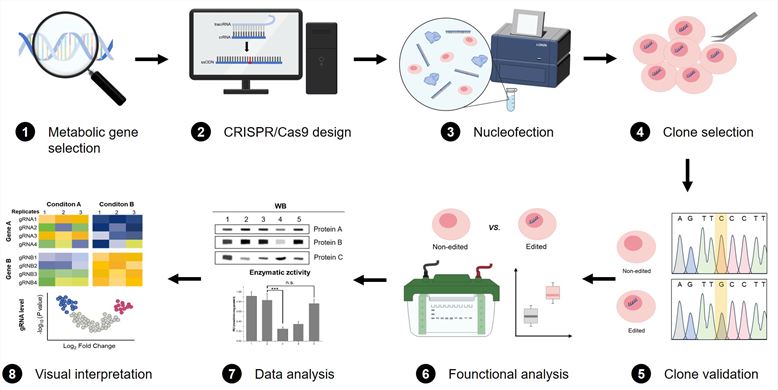Gene-Editing-based Metabolic Gene Functional Assessment Service
With our advanced cellular and molecular technologies, Creative Biolabs has developed a first-class platform for Tumor Energy Metabolism Analysis.
Introduction of Gene-Editing-based Metabolic Gene Functional Assessment
The genomic functional metabolism assessment plays a key role in the mechanism study of tumor resistance and inherited genetic diseases. The advent of the gene-editing system has altered the limits of metabolic gene functional assessment with its applications. Creative Biolabs provides the rapid and high-throughput gene-editing technology to perform functional characterization of mono- or large sets of metabolic genes.
Workflow of Gene-Editing-based Metabolic Gene Functional Assessment
We offer a scientific, one-stop, and whole-process service for Gene-Editing-based metabolic gene functional analysis (as shown in Fig.1). To get more information about the functional assessment of metabolic genes, please inquire about our service of Functional Genetic Screening for Tumor Metabolism.
 Fig.1 Experimental design for gene-editing-based functional assessment. (Creative Biolabs)
Fig.1 Experimental design for gene-editing-based functional assessment. (Creative Biolabs)
Features & Benefits
Creative Biolabs is proficient in the comprehensive gene-editing technology to establish cell models of activation, silence, or other manipulation of the target metabolic genes. The features we have are listed below:
-
Various cell line models for metabolic gene-editing:
-
The haploid status HAP1 cell model, available for genetic editing over 80% of metabolic disorder-associated genes, could easily generate homozygous KI/KO cell clones with rapid doubling time.
-
Cas9-expressing cell model can be transduced or electroporated with sgRNA (with or without ssODN) to successfully generate KO/KI cell clones.
-
High efficiency of gene-editing transfection:
-
Selection of metabolic genes meets the indicated inclusion criteria.
-
Designation of confident single guide RNA.
-
Nucleofection directly delivers the sgRNAs into the cell nucleus.
-
High-throughput genetic screens:
-
Unbiased interrogation of gene function.
-
Detailed biological insights into genes' sensitivity or resistance.
-
Data analysis:
-
Manual inspection with online resources such as PubMed, GeneCards, and OMIM.
-
Software tools and databases such as STRING.
-
Visual interpretation:
-
Heat maps of correlation analysis.
-
Scatter plots of gRNA counts or log fold changes.
-
Volcano plots for differences between two conditions.
Results Display
Frequently Asked Questions
Q: Compared to traditional short hairpin RNA (shRNA)-based system, what advantages does gene-editing technology have in the functional assessment of metabolic genes?
A: Gene-editing loss-of-function libraries provide a greater screening sensitivity, less variation in the data, and fewer off-target effects, which result in good-performing screens with a low false-discovery rate and better consistency across cell lines.
The genetic editing technology could help decipher the molecular pathways, cellular processes, biomarkers, and novel therapeutic targets. Creative Biolabs has established a professional, experienced, and dedicated team to help our clients with metabolic gene functional assessment. Please feel free to contact us for more details.
Reference
-
Li, Hongyi, et al. "Applications of genome editing technology in the targeted therapy of human diseases: mechanisms, advances and prospects." Signal transduction and targeted therapy 5.1 (2020): 1. Distributed under Open Access license CC BY 4.0, without modification.
For Research Use Only | Not For Clinical Use


 Fig.1 Experimental design for gene-editing-based functional assessment. (Creative Biolabs)
Fig.1 Experimental design for gene-editing-based functional assessment. (Creative Biolabs)
 Download our brochure
Download our brochure